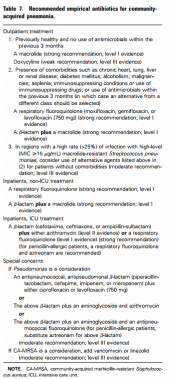Community Acquired PneumoniaHealthy Outpatient: no comorbidities or use of antimicrobials in the past 3 months Treat with macrolide (strong, level 1) or doxycycline (weak, level 3) At-Risk Outpatient: heart, lung, kidney, liver problems, diabetes, immunosuppressed, cancer, asplenic, antimicrobial use in the past 3 months Treat with fluoroquinolone such as moxi,gemi,or levofloxacin (strong, level 1) or a beta lactam PLUS a macrolide (strong, level 1) Inpatient CAP, ICU admission: Treat with a fluoroquinolone (level 1) OR a beta lactam PLUS azithromycin (level 2). If penicillin allergic, fluoroquinolone plus aztreonam is the recommendation. If concerned about Pseudomonas, use an antipseudomonal beta lactam such as: pip/tazo, cefepime, imipenem, meropenem PLUS cipro or levofloxacin (750 mg). If penicillin allergic, aztreonam PLUS aminoglycoside PLUS fluoroquinolone. If fluoroquinolone allergic, beta lactam PLUS aminoglycoside PLUS azithromycin Inpatient CAP, non-ICU admission: Treat with beta lactam PLUS a macrolide (level 1) OR treat with a fluoroquinolone (level 1). Healthcare Associated Pneumonia (HCAP)Please read the new, updated guidelines on HAP/VAP treatment! The below information is now considered out of date. Includes any patient who was hospitalized in an acute care hospital for two or more days within 90 days of the infection; resided in a nursing home or long-term care facility; received recent intravenous antibiotic therapy, chemotherapy, or wound care within the past 30 days of the current infection; or attended a hospital or hemodialysis clinic Low suspicion for multi-drug resistant organisms:
Treat with ceftriaxone, fluoroquinolone, amp/sulbactam, or ertapenem. Remember, you are covering for CAP, plus MRSA and Pseudomonas. High suspicion for multi-drug resistant organisms: Treat with vancomycin or linezolid PLUS cefepime or meropenem or pip/tazo PLUS cipro/levofloxacin or genta/tobramycin You should have a high suspicion for MDR (MRSA, Pseudomonas, Acinetobacter) if: The patient has had prolonged duration of hospitalization (5 days or more), admission from a healthcare-related facility (nursing home, dialysis center), and recent prolonged antibiotic therapy (level 2).
0 Comments
Leave a Reply. |
Categories
Archive
February 2018
Please read our Terms of Use.
|


